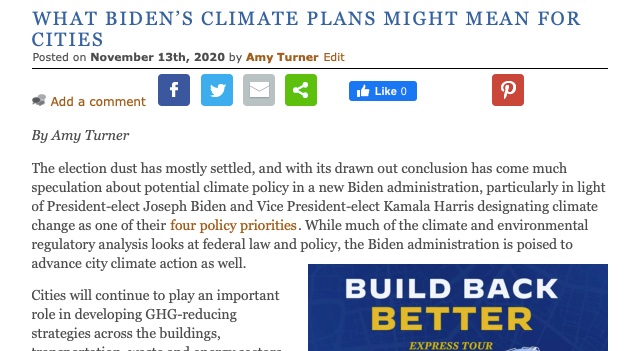The incoming Biden admin has the most ambitious climate plan of any President-elect in history.
What does this mean for cities, who've been leading the charge on climate policy for over a decade?
A lot of good stuff, I hope! 1/12
1/12
http://blogs.law.columbia.edu/climatechange/2020/11/13/what-bidens-climate-plans-might-mean-for-cities/#more-7089
What does this mean for cities, who've been leading the charge on climate policy for over a decade?
A lot of good stuff, I hope!
 1/12
1/12http://blogs.law.columbia.edu/climatechange/2020/11/13/what-bidens-climate-plans-might-mean-for-cities/#more-7089
First, the new administration can set policies and standards that act as floors for energy and emissions reductions, but that leave cities room to innovate new and more ambitious ways to reduce their GHGs. 2/12
Cities have important sources of legal authority - police powers - that allow them to act with respect to health and the general welfare.
Cities use this authority to regulate building energy use and make land use decisions, important elements of local GHG reductions. 3/12
Cities use this authority to regulate building energy use and make land use decisions, important elements of local GHG reductions. 3/12
In this way, cities act as "laboratories" for climate policy. They not only set policy to reduce their own GHGs, they develop models for other cities, states & even the fed govt.
If federal policy oversteps this local authority, we'll lose out on city-climate innovation. 4/12
If federal policy oversteps this local authority, we'll lose out on city-climate innovation. 4/12
Second, and at the same time, cities are preempted from many direct means of limiting GHGs. Think of vehicle policy - cities are preempted by the Clean Air Act and EPCA from requiring low emission vehicles. Or energy - cities can scale up renewables but only to a point. 5/12
The incoming Biden administration can help fill some of these gaps -- strengthening EV policy, fulfilling the campaign promise of 100% clean electricity by 2035.
This would make federal GHG policy complementary to city policy, rather than encroach on local innovation. 6/12
This would make federal GHG policy complementary to city policy, rather than encroach on local innovation. 6/12
Third - and perhaps most obviously - the federal government can provide funding to cities for GHG-reducing strategies. City budgets are normally tight, and are stressed to the max post-covid. Public transit systems are particularly in crisis.
Federal $$ is needed. 7/12
Federal $$ is needed. 7/12
Congress has the power of the purse, so we'll see how much will be allocated to city climate action. But Biden's $2 trillion Build Back Better plan is a solid indication of the scale of his ambition.
This $ could be used to fund transit, building retrofits, green jobs etc. 8/12
This $ could be used to fund transit, building retrofits, green jobs etc. 8/12
Fourth, and finally, the incoming administration can set guardrails for protecting those most vulnerable to climate change, and for including & amplifying the voices of environmental justice & frontline communities. The Biden-Harris EJ plan is a solid step in this direction. 9/12
The administration should recognize that it cannot play the ground-up organizing role that is so critical to city climate policy. The fed govt can offer support and some ground rules, but it shouldn't supplant the work being done by advocates alongside their local leaders. 10/12
Local advocacy is a central part of city climate policy and, by extension, a driver of climate policy around the country.
Local expertise - from both advocates & officials/staff - is critical to ambitious city policy that can lead the whole US to its low-carbon future. 11/12
Local expertise - from both advocates & officials/staff - is critical to ambitious city policy that can lead the whole US to its low-carbon future. 11/12
We have an opportunity to combine the benefits of federal climate action & local climate innovation.
Cities will continue leading on climate. The incoming Biden admin can help, so long as cities' inherent authority and hard-earned expertise are understood and respected. 12/12
Cities will continue leading on climate. The incoming Biden admin can help, so long as cities' inherent authority and hard-earned expertise are understood and respected. 12/12


 Read on Twitter
Read on Twitter


